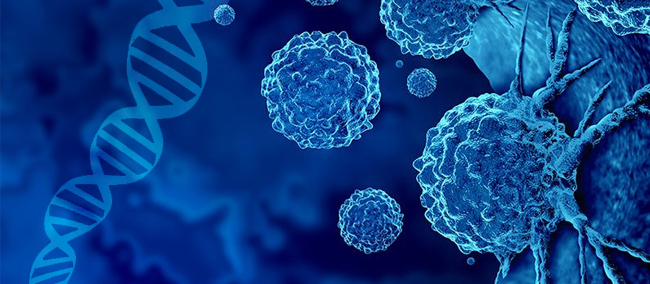
All cancerous tumors exhibit these reversible epigenetic changes that could represent novel reprogrammable targets to address drug resistance (1). Recent research published in Communications Biology provides essential information about the specific epigenetic alterations that may be responsible for chemotherapy resistance (2).
Drug Resistance in Cancer
More than 90% of the mortality caused by cancer can be linked to drug resistance (3). The molecular mechanisms mediating drug resistance in cancerous cells include increased function of enzymes that render drugs ineffective, mutations in drug targets, and abnormal efflux pump activity (4).
Efflux pumps are members of the ATP-binding cassette (ABC) transporter family that are expressed on the surfaces of nearly all cells in the body, both healthy and cancerous. As the name suggests, efflux pumps transport foreign substances out of cells to prevent toxicities. They are capable of transporting many of the common chemotherapeutics, including small-molecule tyrosine kinase inhibitors, taxanes, and anthracyclines (5).
When efflux pumps are over-active or overexpressed, cells can become resistant to chemotherapeutic effects. Several clinical trials attempted to inhibit efflux pumps to retain the effectiveness of chemotherapeutics; however, drugs that target efflux pump function also affect healthy cells. This can result in toxicities in healthy cells caused by increasing drug concentrations in the cells (5).
Epidrugs to Address Drug Resistance
A new generation of therapeutics, epigenetic cancer therapeutics (epidrugs), targets differences in methylation or acetylation of DNA sequences that alter transcription of genes involved in cancer and drug resistance (6). FDA-approved epidrugs for the treatment of cancer include DNA methyl transferases (DMNT)and histone deacetylase (HDAC) inhibitors. Decitabine (5-aza-2′-deoxycytidine nucleoside), for example, is a DMNT inhibitor that reduces methylation of CpG dinucleotides.
Although the effects are decitabine are relatively broad, and pretreatment is often necessary, administration of decitabine is associated with reduced levels of efflux pumps and restoration of drug sensitivity (7). However, cancerous cells are also capable of developing resistance to decitabine (8,9). A better understanding of epigenetic regulation of drug resistance is critical, especially for cancers with high resistance and low survival rates like acute myeloid leukemia (AML). Previous reports published by What is Epigenetics highlight this need (10).
Epigenetics of Acute Myeloid Leukemia
Acute myeloid leukemia affects about 75,000 people in the US alone and has an average 5-year survival rate of approximately 30% (11). Monotherapies for AML include decitabine, which disrupts the ability of DNA methyltransferase to modify promoters and reduces the transcription of genes involved in the development of AML (12). The identities of these genes have not been described but are thought to include microRNAs that further amplify the regulatory effects of the drug (13).
Recognizing the strength of identifying methylation sites in the genome, researchers from the University of Milan produced a whole genome methylation map from AML tumor cells (3). Importantly, the researchers considered these patterns both at the time of diagnosis and upon relapse, which allowed them to make inferences about methylated genes that could contribute to drug resistance.
Using a high-resolution approach, the researchers identified methylation patterns in more than 99% of CpGs in the human genome, a resolution that is significantly higher than previously reported. Analysis revealed that the methylomes from AML-relapsed cells were hypermethylated in CpG islands and in sparse CpG regions. Interestingly, despite being resistant to treatment, the genes that were up- and downregulated were not classically associated with drug resistance.
The set of hypermethylated genes was enriched for transcription factors that regulate more than 50% of the genes that are differentially regulated in relapsed cells. The researchers concluded that large gene regulatory networks modulated by these transcription factors deregulate thousands of genes that affect drug resistance processes, including decreased drug uptake and increased drug efflux.
Because epigenetic modifications are reversible, the results of this study open new, exciting avenues for identifying treatments for drug-resistant cancers. Novel drugs could reduce toxicities, increase the survival of patients with cancers like AML, and lend specificity to strategies already exploited by drugs like decitabine.
References:
- Mohammad HP, Barbash O, Creasy C. Targeting epigenetic modifications in cancer therapy: erasing the roadmap to cancer. Nature Med. 2019;25:403-418.
- Magi A, Mattei G, Mingrino A, et al. High-resolution nanopore methylome-maps reveal random hyper-methylation at CpG-poor regions as driver of chemoresistance in leukemias. Commun Biol. 2023;6(382).
- Bukowski K, Kciuk M, Kontek R. Mechanisms of multidrug resistance in cancer chemotherapy. Int J Mol Sci. 2020 May;21(9):3233.
- Housman G, Byler S, Heerboth S, et al. Drug resistance in cancer: an overview. Cancers (Basel). 2014 Sep;6(3).
- Robey RW, Pluchino KM, Hall MD, et al. Revisiting the role of efflux pumps in multidrug-resistant cancer. Nat Rev Cancer. 2018 Jul;18(7):452-464.
- Furtado CLM, Luciano MCDS, Santos, RDS, et al. Epidrugs: targeting epigenetic marks in cancer treatment. Epigenetics. 2019 Dec;14(12):1164-1176l.
- Kurimoto M, Matsuoka H, Hanaoka N, et al. Pretreatment of leukemic cells with low-dose decitabine markedly enhances the cytotoxicity of gemtuzumab ozogamicin. Leukemia. 2013;27:233-235.
- Onda K, Suzuki R, Tanaka S, et al. Decitabine, a DNA methyltransferase inhibitor, reduces P-glycoprotein mRNA and protein expressions and increases drug sensitivity in drug-resistant MOLT4 and Jurkat cell lines. Anticancer Res. 2012;32:4439-4444.
- Qin T, Castoro R, El Ahdab S, et al. Mechanisms of resistance to decitabine in the myelodysplastic syndrome. PLoS One. 2011;6(8):e23372.
- Owens T. Epigenome map of cell may help show cancer evolution and drug resistance.
- What is Epigenetics? Accessed June 1, 2023.
- National Cancer Institute. Surveillance, Epidemiology, and End Results Program. Cancer Stat Facts: Leukemia—Acute Myeloid Leukemia (AML). Accessed May 25, 2023.
- Malik P, Cashen A. Decitabine in the treatment of acute myeloid leukemia in elderly patients. Cancer Manag Res. 2014;6:53-61.
- Fan D, Ting J, Wang L. Mechanism of action of decitabine in the treatment of acute myeloid leukemia by regulating LINC00599. Anal Cell Pathol (Amst). 2023:2023:2951519.


